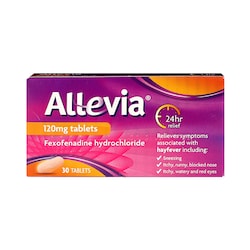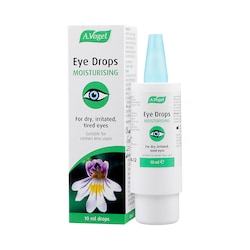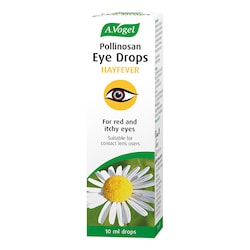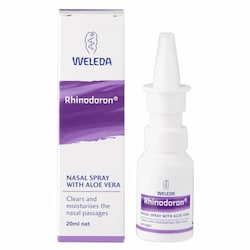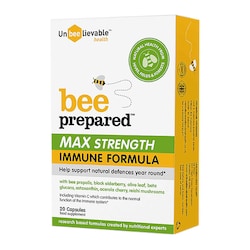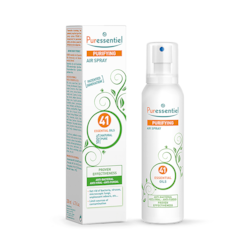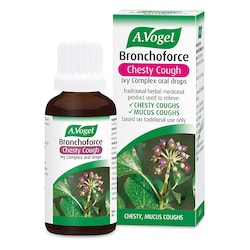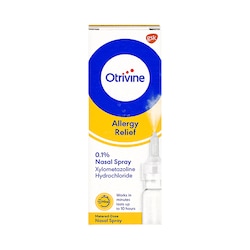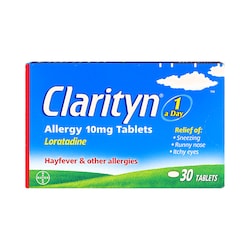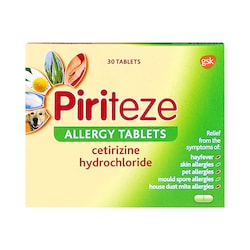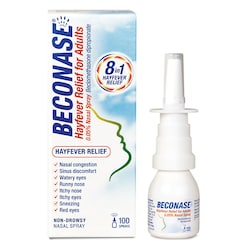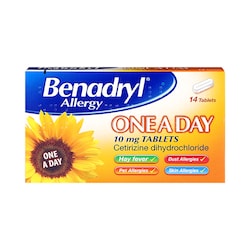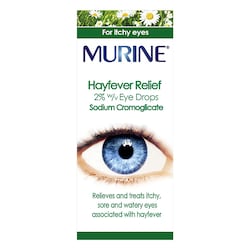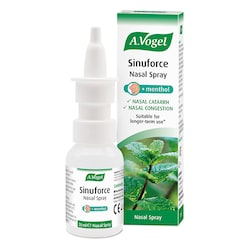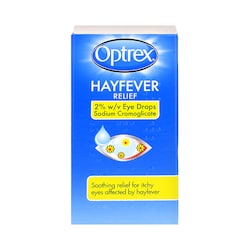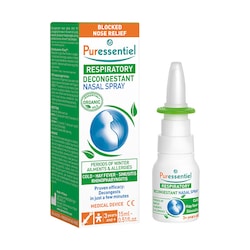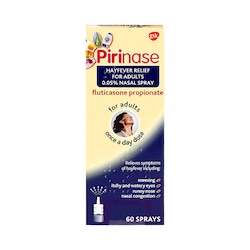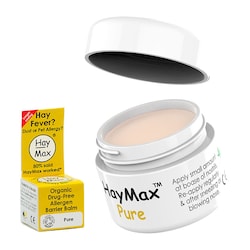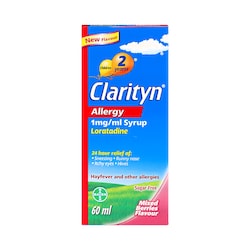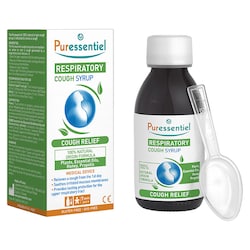20% off £30
Hay fever: what is it and what causes it?
.png)
It’s early spring or summer, your nose is stuffed up and your eyes are itching and streaming. Pretty sure it’s not a cold? It’s more likely to be hay fever, which affects up to 30% of adults and 40% of children in the UK.1 And unlike a cold, the symptoms can go on for months!
Here’s what to do if you regularly get hit by hay fever.
What is hay fever?
Hay fever is an allergic reaction to pollen.2
It happens when pollen enters your system and, instead of ignoring it, your body sees it as an invader and mounts a reaction to attack it.
One of the chemicals released during this reaction is histamine, which makes blood vessels wider and triggers allergy symptoms like a blocked nose or streaming, itchy eyes.3
While it’s traditionally thought of as a summer problem, hay fever can actually start to affect people as early as February and the season continues until September.4
What causes it?
In the UK, hay fever symptoms are mostly triggered by pollen from trees, grasses and weeds, as well as environmental moulds.
The time of year of your symptoms flare up can give you an idea of which type of pollen you’re reacting to:5
- February to June – tree pollen
- May to July – grass pollen, the most common hay fever trigger
- June to September – weed pollen
If your symptoms are year-round, this might be due to combination of the above allergens and/or sensitivity to indoor allergens, including dust mites and pets.
What are the symptoms of hay fever?
Common symptoms include:6
- sneezing
- runny or blocked nose
- watery, itchy eyes
- itchy mouth or tongue
- headaches
- tiredness
- wheezing
When does hay fever develop?
People are most likely to develop hay fever during their childhood or teenage years. It’s more common in boys than girls, and in those who have a family history of allergies.7
Many children who develop eczema in early childhood also have a tendency to develop hay fever.
However, while 10-20% of those who develop hay fever early in life see their symptoms improve as they get older, anecdotally, doctors are seeing an increase in the number of adults developing hay fever for the first time in mid-life.8,9
This may be because the presence of sensitisation and constant exposure to one allergen can trigger the development of an allergy to other allergens, and why – if an allergy is left untreated – it usually gets worse.
Why has there been a rise in hay fever?
The increase in numbers of people suffering from hay fever is not clearly understood, but theories include our cleaner lifestyles making the immune system more reactive.10
A higher pollen count could also be to blame, combined with a rise in pollution – indeed, sufferers often find their hay fever symptoms get worse in cities.11 A 2003 report by the US Department of Agriculture found that ragweed growing in urban areas grew faster, flowered longer and produced more pollen than in the countryside.12
Climate change may also have an effect, as warmer temperatures lengthen growing seasons for trees, weeds and grasses. A 2014 study by the University of Leicester found ragweed pollen at its highest level in 40 years; this plant isn’t normally found in the UK but is a common trigger for hay fever in Europe. It’s thought an increase in average temperatures could be linked to the rise.13
How to manage your hay fever
Unfortunately, there’s no cure for hay fever, but you can manage it with a number of hay fever treatments.
The chemicals released in hay fever include histamines, so antihistamines – which block the effect of histamines – are often prescribed, in the form of pills, nasal sprays and eye drops. Corticosteroids, which help reduce inflammation, can also help.
Antihistamines are most commonly used to control hay fever, and you can get them over-the-counter – just make sure they’re non-drowsy.
If your hay fever symptoms are still troublesome, steroid nasal sprays can help by dampening down the body’s allergic response.14
It’s also advisable to see an allergy specialist to discuss other treatments.
How to best limit your exposure to pollen
It’s important to also limit your exposure to pollen. Try these top tips:15
- wear wraparound sunglasses outside the house
- shower and wash your hair when you come indoors
- change into clean clothes when you get home
- avoid drying your washing outside
- apply a barrier balm to your nostrils – these sticky balms trap pollen and may prevent it entering your system
If you don’t want to take medicine all spring and summer, there are lots of ways you can help yourself naturally.
Natural remedies for hay fever
Natural remedies may also offer support to combat the symptoms of hay fever.
Butturbur
A 2007 study by the University of Exeter found that butterbur may help ease symptoms of hay fever, though a 2004 study found it had no significant effect.16,17
Quercetin
A study published in the journal Molecules in 2016 reported that quercetin – found in a range of fruit and veg, including onions and berries – has an anti-inflammatory effect and can curb the release of histamine.18
Local honey
There’s a theory that exposure to small amounts of pollen in locally produced honey may desensitise you. Ideally, start two months before the pollen season.
Tackle stress
Stress may worsen hay fever symptoms, according to research. Try unwinding with yoga, meditation or tai chi.
Get your vitamin D
Some studies have connected low levels of vitamin D with hay fever and other allergies, so get out for a daylight walk, with your skin exposed and without sunscreen, for about 10 minutes each day.
Try acupuncture
Research shows regular sessions may reduce the need for hay fever medicine.
When to see your GP
A pharmacist can normally offer advice on how to treat hay fever, but see your GP if your symptoms don’t improve using over-the-counter remedies. They may prescribe different medication and consider desensitisation treatment to influence the cause of the disease i.e. allergen-specific immunotherapy.19
Last updated: 12 May 2022
- www.allergyuk.org/information-and-advice/statistics
- www.allergyuk.org/information-and-advice/conditions-and-symptoms/47-about-allergy
- https://www.allergyuk.org/information-and-advice/conditions-and-symptoms/47-about-allergy
- https://www.allergyuk.org/information-and-advice/conditions-and-symptoms/11-hay-fever-allergic-rhinitis
- https://www.allergyuk.org/information-and-advice/conditions-and-symptoms/11-hay-fever-allergic-rhinitis
- https://www.allergyuk.org/information-and-advice/conditions-and-symptoms/11-hay-fever-allergic-rhinitis
- www.nhsinform.scot/illnesses-and-conditions/immune-system/hay-fever
- www.nhsinform.scot/illnesses-and-conditions/immune-system/hay-fever
- www.telegraph.co.uk/health-fitness/body/many-people-suddenly-suffering-hay-fever-middle-age/
- news.bbc.co.uk/1/hi/magazine/8763115.stm
- www.telegraph.co.uk/health-fitness/body/many-people-suddenly-suffering-hay-fever-middle-age/
- www.ncbi.nlm.nih.gov/pubmed/12589347
- www.medicalnewstoday.com/releases/283082.php
- www.allergyuk.org/information-and-advice/conditions-and-symptoms/47-about-allergy
- www.ncbi.nlm.nih.gov/pubmed/18219828
- www.ncbi.nlm.nih.gov/pubmed/15281472
- www.ncbi.nlm.nih.gov/pubmed/27187333
- www.nhs.uk/conditions/hay-fever/
- www.nhs.uk/conditions/hay-fever/


